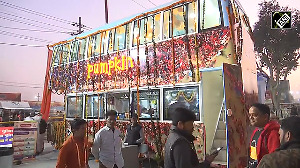Following a meeting between the foreign ministries of India and Bangladesh on July 24 at New Delhi, Dhaka expressed its dissatisfaction at the delay in the implementation of the Land Boundary Agreement and taking any action on the issue of water sharing. But the Bangladesh government has decided to give the Indian government some "space" as it recognised that New Delhi has to take care of internal and political compulsions before resolving these issues.
Foreign Secretary Ranjan Mathai and his Bangladesh counterpart Mohammad Mijarul Quayes led their respective delegations to the annual bilateral Foreign Office Consultation that continued for two hours. According to a Bdnews24.com report, Quayes had conveyed to Mathai Dhaka's concern over the slow pace of the implementation of the 1974 Land Boundary Agreement and the protocol signed during Prime Minister Manmohan Singh's visit to Dhaka in September, 2011.
It was pointed out by the Bangladeshi side that further delay in the implementation of these would send out a "wrong signal".
During Dr Singh's visit of Dhaka in September 2011, a protocol was signed to the LBA of 1974 between foreign ministers of the two countries to address "outstanding land boundary issues and provide a final settlement to the India-Bangladesh boundary".
While briefing the media on July 24 following the meeting, Quayes said that though he was convinced that New Delhi is serious about implementing the inked deal, Bangladesh was keen on "fast forward movement on it".
The Bangladesh side had conveyed its urgency to Indian officials during the talks for the implementation of the agreement on land boundary demarcation and exchange of adversely-held enclaves signed during Dr Singh's visit to Dhaka last year, "as it is important to deliver on it".
"It's not in the interest of Bangladesh or in the interest of India to make a commitment and not deliver on it," Quayes said.
"We have been assured by the Indian side that efforts are on to implement the land boundary agreement," he added.
At the moment, Delhi needs to get the agreement ratified by the Parliament before implementing it, as exchange of land will be involved in the process.
About sharing the water of Teesta River, the issue was held up at the last minute prior to Dr Singh's visit, due to West Bengal Chief Minister Mamata Banerjee's last-minute objections.
Quayes said, "Things appear to be moving forward on the agreement and Bangladesh wants to give space to India to finish its internal consultations on the Teesta issue."
About border firings, Quayes said that Bangladesh has conveyed to India that in cases of illegal crossing along the border, firing and killings was not always the answer. "The act of shooting and killing does not reflect well on the bonhomie in bilateral partnership," Quayes said.
In this context, he said, Bangladesh has proposed the revival of interaction between local administration in border districts on both sides and "India has agreed to seriously consider it".
Quayes reasoned that if local administrations on either side of the border interact with each other frequently, many undesired incidents can be avoided. He added that incidents of border killings had reduced considerably.
On the issue of the controversial Tipaimukh multipurpose project in Manipur, Quayes mentioned that Bangladesh had finalised a team for the joint survey of the project.
On expediting implementation of projects under the $1 billion line of credit extended by India to Dhaka during Bangladesh Prime Minister Sheikh Hasina's visit to New Delhi in January 2010, Quayes said that projects worth $183 million are in the pipeline and some of these projects would come through by August this year.
Issues related to security and connectivity -- like the use of Ashuganj port, power sector cooperation -- were also discussed at the meeting.
Prior to the meeting, during a Consultative Committee meeting of the home ministry, Home Minister P Chidambaram said that a sum of Rs 990 crore has been allocated for the Border Area Development Programme.
The BADP comprises currently of 358 blocks of 96 border districts of 17 states located along the international Land Border. Chidambaram informed that India has approved the construction of an additional 509 border outposts -- 383 on the Indo-Bangladesh Border and 126 on the Indo-Pakistan Border. Chidambaram said that the increased number of border outposts will help in the effective monitoring of the border.






 © 2025
© 2025